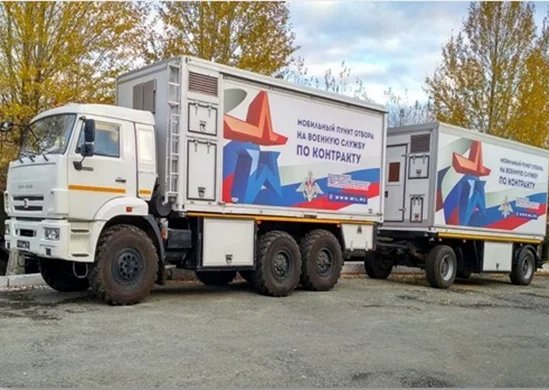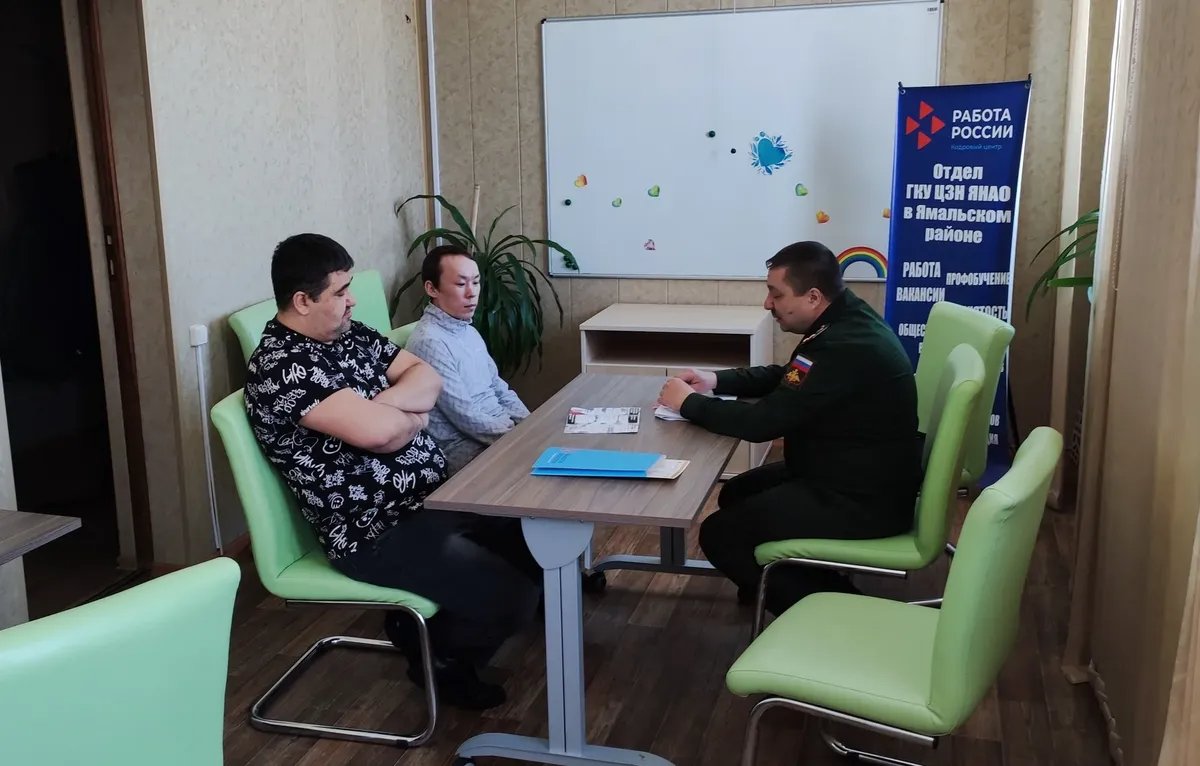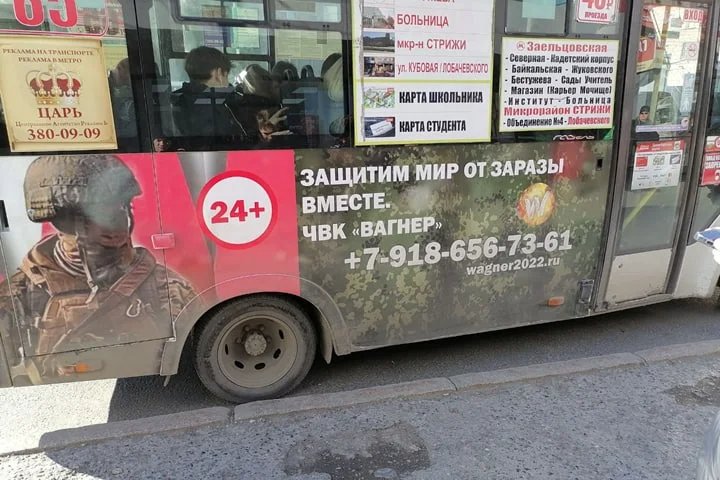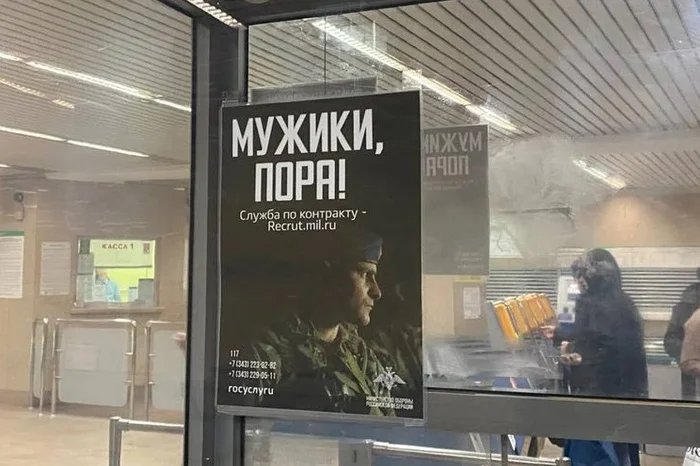Vladimir Putin signed a law on digital enlistment notices last week, which makes it considerably easier for Russia to draft people for the war. However, the Kremlin is not ready to declare the second wave of mobilisation yet: it is trying to patch holes on the frontline using contracted soldiers and volunteers.
We found 75,000 advertisements encouraging Russians to go to the battlezone on VK, Russia’s biggest social media, and 75% of those were posted in the last two months. Those ads are being posted by hospitals, job centres, libraries, and even kindergartens. Here is how the Russian authorities have unfolded the biggest recruiting promo campaign since the start of war.
Vaskovo, a locality in the Arkhangelsk region, has a population of a little over 1,000 residents. Seven graduates of its only school went to war last year, and two of them are already dead. Sergey and Mikhail were buried at the local Patriot Park and decorated with Medals for Valour posthumously as guns were fired and fireworks were set off in their honour.
Tatyana (her name has been changed), a teacher at the local school, has known all the soldiers ever since they were little boys. She teaches a health and safety training course at the school, and also provides shooting training for teenagers at a local Centre for Early Military Education.
Two of her graduates came to Vaskovo on vacation in March: one of them serves not far from his home, while the other is in Ukraine.
“When I found out the boys were here, I invited them to attend an Important Conversations lesson (a weekly class in Russian schools where students are being “taught patriotism” — Novaya-Europe). I asked them to tell our kids about what salaries, social benefits, housing and meals servicemen receive,” Tatyana says. “The point of such meetings is to explain to high-schoolers that military service is a real career opportunity”.
There are only six teenagers studying in grade 11 at the Vaskovo school: a girl and five boys. Two of them have already decided to sign a contract with the Defence Ministry after they graduate.
A nationwide hidden mobilisation started in Russia this spring. VK pages of governors, city groups, local media outlets, public services centres, and even schools posted at least 53 thousand advertisements calling on Russians to join the armed forces: that is seven times as many as there were last summer. Back then, the Kremlin was also hoping to recruit enough volunteers, but eventually had to declare a “partial” mobilisation in September. We have found a total of 75,000 such ads posted on VK since the start of the war.
Almost 90% of such posts are advertisements for contract service, another two and a half thousand are searching for volunteers or recruiting to PMC Wagner. Here are some of the popular advertising slogans: “Contract service is the choice for real men!”, “Military service is stability and confidence in life!” and “Your country needs you!”
Bloomberg estimates are that the Kremlin is planning on sending 400,000 contracted servicemen to Ukraine in 2023. The media outlet says this is required to avoid the second wave of mobilisation ahead of the 2024 presidential election, since the first one “shook public confidence”.
To replenish its manpower losses, the Kremlin has already started to redeploy some of its valuable troops: many servicemen from the Pacific Fleet arrived at Vuhledar in February.
“Those are pretty valuable professionals. The fact that they are being sent to Ukraine shows how much the Defence Ministry is eager to avoid mobilisation, using every trick in the book,” says Kirill Mikhailov, a military expert.
The previous attempt to arrange a hidden mobilisation failed: only several dozens of thousands of men were recruited into the military last summer, Mikhailov says. The Defence Ministry has very little chance even to reach the same figure.
“Last summer, people with short-term contracts would go to war in order to make some money. Now the Defence Ministry only signs contracts with no expiration dates, and those will only expire upon Putin’s decision. It has become much more difficult to recruit soldiers. Additionally, people are pretty much aware of how things are going at the frontlines.”

Photo: Defence Ministry
Guarding the Fatherland
Employees of “Security”, a private agency near Moscow and a National Guard entity, guard civilian facilities. Security guards earn no more than 42,000 rubles [€470] in this region, as per HeadHunter, a Russian jobs website.
In spring, the agency’s employees started receiving offers from their superiors to embark on a “business trip” to Luhansk, with a “24 hours of work and 72 hours off” schedule. The offered reward was way bigger than the regular salary: 129,000 rubles [€1,440], not to mention death and injury compensations.
These guards are only willing to go to war for the money they would never make working for a civilian contractor.
The Defence Ministry makes no secret of its intention to increase its manpower. Sergey Shoigu, the Defence Minister, set a goal for draft offices all across the country in December: to recruit over 500,000 contracted soldiers into the military by the end of the year. Those will need to replace the draftees that are fighting in Ukraine at the moment.
25,000–70,000 rubles [€280–€780] is the monthly salary offered to employees of the Russian Post for joining the military. There is no need for them to sign a contract with the Defence Ministry: the mail giant is going to pay the salaries on its own. This is the offer an employee of the Russian Post received this spring and shared the details with us. The man was not fit for military service.
The salary, equipment, and death compensation vary from one employer to another. Volunteers from the “DPR” are being offered 76,000 rubles [€850] a month, contracted soldiers are offered 195,000 [€2,170], and Wagner mercenaries are offered 240,000 [€2,670].
There are currently 650 vacant military jobs on the hh.ru website, salaries varying between 20,000 and 300,000 rubles. Military units hire machine gunners, drivers, electricians, mechanics, and paramedics with minimum requirements: to pass three tests that check strength, quickness, and endurance. The job descriptions do not mention where applicants are about to work, but promise free transfer, a mortgage worth up to 6 million rubles [€67,000] and a salary starting from 200,000.
Cradle patriotism
All sorts of public institutions are being used to recruit Russians, from hospitals to local parliaments. Advertising of contract service appears in the hallways of residential buildings, social networks of city halls, on schools’ websites, and the government of the Kaliningrad region even mentioned its plans to “inform” locals by phone.
At least 19,000 posts advertising Defence Ministry contracts have appeared in the social media profiles of regional authorities since the start of the war. Another 3,700 were posted in groups of educational and other public institutions, including public services centres, museums, and libraries. That said, 40% of the ads are being shared in groups that do not focus on any specific topic.
In March, the governor of the Stavropol region instructed at least nine schools in the region to post advertisements of “military jobs in Ukraine” on their social media profiles. From these ads, kids may learn how much soldiers earn for assault or destroyed Ukrainian equipment, and how big the death compensation is.
On 5 April, promo posts advertising military service appeared in five accounts of Astrakhan region kindergartens. Among the benefits listed in the ads are college scholarships and paid tours to children’s summer camps, offered to those who sign a contract with the Defence Ministry.

Photo: a kindergarten in Russia
Since the start of the war, kindergartens, schools, vocational education facilities and universities posted over 1,700 posts in their social media profiles, calling on people to join the armed forces.
Moreover, military service is being advertised on moveable info points, job centres, hospitals, communal hallways, and metro stations.

Photo: Job centre in the Yamal district
Competition between regions
To fulfil the Defence Ministry plan, regions are introducing support measures and using their budgets for promotion. Social media groups from the Chelyabinsk region posted over 2,600 ads about military jobs since the start of the war — more than in Moscow. The regions of Volgograd, Samara, and Yekaterinburg are also holding an active promotion campaign.
How regions fulfil their contract service quotas
Number of contract service ads posted in regional groups
Source: vk.com
Wagner tour
Ramzan Kadyrov [the head of Chechnya] announced his intentions to set up his own private military company in December: “It is safe to say now that PMC Wagner has proven its military efficiency and drew the line under the debate of whether PMCs are necessary. There is no doubt that such professional formations are much needed.” It was soon revealed that Gazpromneft was to set up its own private security company, which many experts believe to be a potential addition to the Russian Armed Forces as a volunteer unit.
PMC Wagner’s advertising campaign shows that it has proven its efficiency to the Kremlin. The leader of PMC Wagner Yevgeny Prigozhin announced the opening of 42 recruitment centres nationwide. “We have designed 300 routes and in April we will travel almost 400,000 kilometres and visit 36,097 locations in our country,” the Wagner group said.
In the spring, Wagner ads appeared on billboards in Moscow, on buses in Ufa, Simferopol, Novosibirsk, and in the hallways of residential buildings.

Photo: “Let’s protect the world from vermin together. PMC Wagner.” SibMedia
“Fancy an unforgettable and useful experience and make new friends? The travel company PMC Wagner offers the hottest tours to Europe, Africa, and the Middle East.” This is what Wagner’s advertising looks like in city groups. PMC promises volunteers a salary starting from 240,000 rubles a month, bonuses “for achievements” and “the best equipment.”
“The Wagnerites are more successful than the regular military even in media terms. They are also the only force capable of making advances at Popasna and Bakhmut. Therefore, the authorities are willing to help Prigozhin recruit volunteers,” says Kirill Mikhailov. “The Russian state is based on a competition between law enforcement agencies, and each wants to prove its worth. PMC Wagner has proven its worth and now receives certain preferences from the authorities, which the Defence Ministry has to reckon with, and is also forced to compete with Wagner in the volunteer market.”
On 1 December last year, a Wagner advertisement was first shown on television: the RT channel filmed a story where a PMC employee talks about the training of fighters. At the end of February, a video message from Prigozhin, who calls for signing up for PMC Wagner in order to “meet the nuclear war in the right way”, was broadcasted by the Crimea24 TV channel.

“Guys, it’s time!” A contract service advertising billboard in the metro, Yekaterinburg. Photo: E1.ru
Defeat or mobilisation
The Russian Defence Ministry is planning to recruit a record number of 147,000 conscripts during this spring’s enlistment window. The State Duma approved on 4 April that soldiers undergoing mandatory conscription may be used in peace-making missions. This would allow Russia to use its contracted soldiers, deployed in Transnistria and Armenia, and send them to the war.
“Mandatory conscripts are the only force that is guarding Russia’s borders now since almost all seasoned servicemen are in Ukraine. This is why [Russia’s authorities] need them in big numbers. To fulfil this quota, they are using the most draconian methods they have,” Mikhailov says.
On 11 April, the State Duma adopted another law: on digital enlistment notices, or summonses. The most important point of the amendments is that printed notices are no longer required to be delivered to a potential conscript in person: those may now be simply sent as messages on the Gosuslugi website. If a person fails to show up at a designated military draft office within 20 days, he will face additional restrictions listed by the new law: he will be banned from driving vehicles, buying or selling real estate, receiving loans from banks, and so on.
If there is a second wave of mobilisation, this law would allow conscription offices to draft much more people than it did during the first wave, using a “digital Gulag” for the draftees.
The Ukrainian Armed Forces report that Russia suffered record losses in March, namely 24,000 servicemen. With such losses, the Russian military requires significant injections of manpower, which are impossible if only volunteers are recruited, Mikhailov says:
“If Russia continues to use ‘cannon fodder assaults’ which require a large expenditure of manpower, the Kremlin will face a bitter dilemma, same as last September: a strategic defeat or a mobilisation. What option is more dangerous for the regime’s stability? Probably a defeat.”
Join us in rebuilding Novaya Gazeta Europe
The Russian government has banned independent media. We were forced to leave our country in order to keep doing our job, telling our readers about what is going on Russia, Ukraine and Europe.
We will continue fighting against warfare and dictatorship. We believe that freedom of speech is the most efficient antidote against tyranny. Support us financially to help us fight for peace and freedom.
By clicking the Support button, you agree to the processing of your personal data.
To cancel a regular donation, please write to [email protected]

